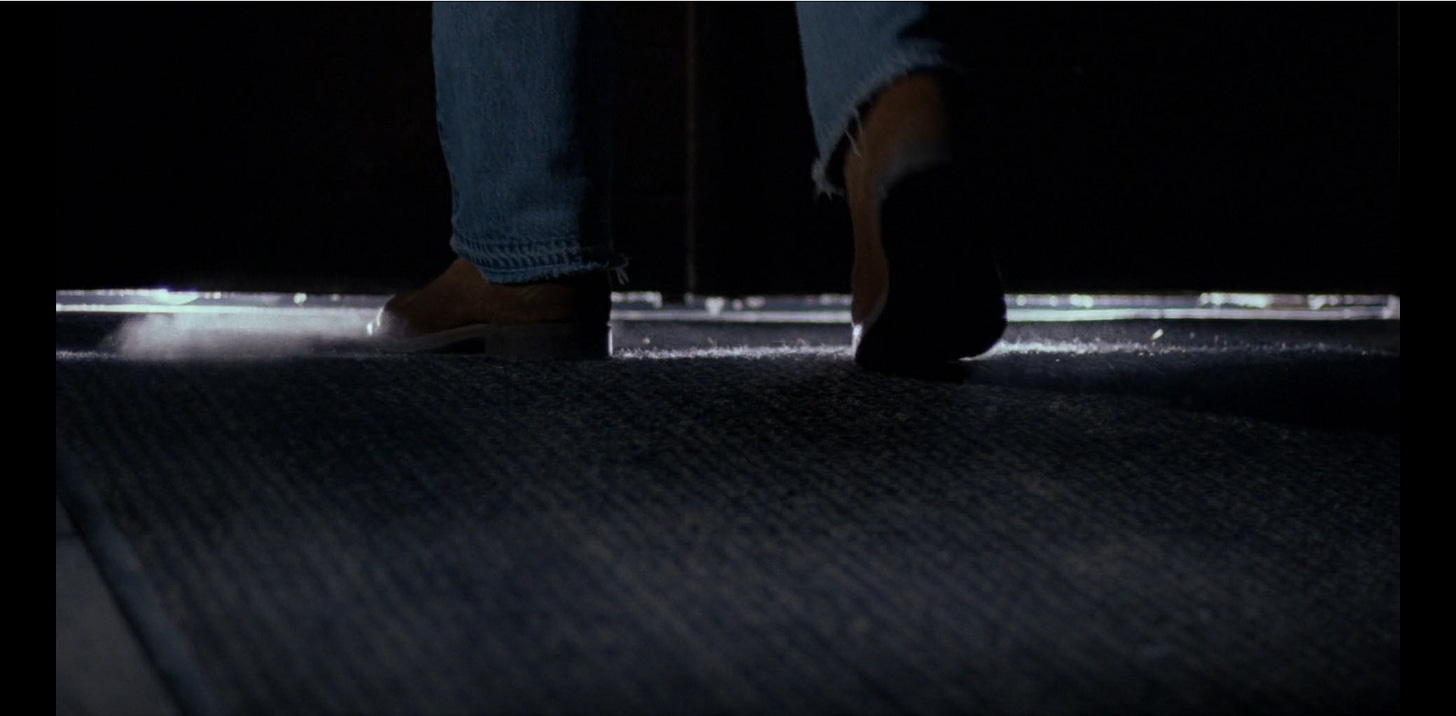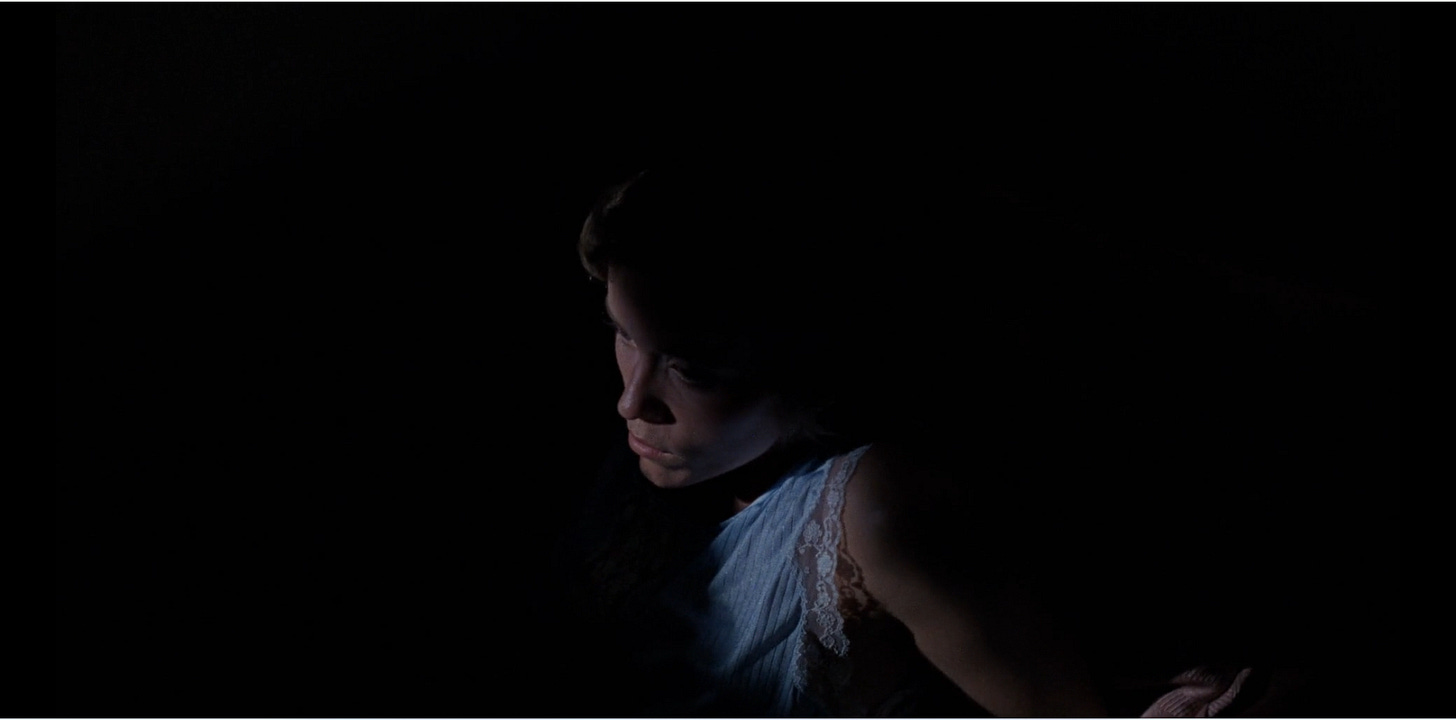This is the third in a series on the Coen Brothers. Previous posts can be found here.
What do we look for in a debut film? If our expectations are properly calibrated, we probably don’t expect it to be good. So much can go wrong—with the script, the actors, with basic continuity and construction. Shooting is a live process where if the director skips a shot and doesn’t realize until they’re in the edit, there’s no going back and getting it. Over all this looms the unavoidable issue of money; sets cost money, film stock costs money, good actors cost money. And in the end it comes down to feel—do the jokes land, is the tension there, can you make the audience care? Even a movie like Sorry to Bother You, which is quite competent, features a number of scenes that just peter out and end without feeling like they had a clear point. To expect a first effort to check every box required for full success is to set oneself up for disappointment almost every time.
My criterion instead is more like potential. If we treat this movie as a tryout, what have they shown us about what they could make in the future with more resources and practice? This is something of a trap in its own right because a young director could agonize endlessly over how best to showcase their potential. A successful work of art ultimately has to be true to itself, which will capture some part of its creator but hardly the whole. Many aspirants thus aim for excess, on the logic that if they can do all that then surely they could do something more conventional. Think of Richard Linklater’s Slacker, which sets out to prove he can write forty different convincing weirdos for one movie. Think of Michael Bay, Tony Scott, and the rest of those guys who came up through commercials and music videos who pushed their editing to new heights of freneticism to dazzle producers with the pace of the thing1.
For me though that instinctive move toward excess often reads as anxiety. Driven by insecurity around their craft or around having something meaningful to say or just wanting too badly not to waste their chance, they default into doing the most possible. What I value far more is a debut film that’s made with confidence. By that I mean a film that demonstrates an understanding by its makers of what they had to play straight and get right and where they had the space to add a flourish and make choices no one else would.
Because our culture values novelty over competence, what we see much less is something familiar, done exceptionally well. It’s a big risk—if that execution is anything less than perfect, if that film doesn’t absolutely sing, then what do you have to show for it? You made an okay movie and you didn’t showcase yourself enough for anyone to care. You could very easily never get a second chance. The stakes are that high. If the reviews are bad, if it doesn’t make money, that could be it. One and done. Career over as soon as it starts.
Joel and Ethan Coen were acutely aware of these stakes as they approached making their first film, Blood Simple. They were making the film outside the studio system with a budget of just over $1 million raised arduously from individual private investors, with no distribution deal set up. If the final product didn’t sell itself—and them—it would be a long time, if ever, before they got a second chance.
As the opening voiceover says, “The world is full of complainers. The fact is nothing comes with a guarantee. Now I don’t care if you’re the Pope of Rome, the President of the United States, or Man of the Year—something can always go wrong.” Rather than agonizing over what could go wrong they simply chose to do it all. They would make a thriller both straightforward and twisty that would, above all, entertain. It would be immaculately constructed, so much so that it might butt up against the risk of being impersonal. And yet they would transcend the cliches of genre to convey a startlingly full sense of who they were.
Blood Simple has four main characters and basically two other speaking parts but it never feels artificially constrained. It has three sets, give or take, but never feels claustrophobic. It’s a murder-for-hire plot that does not include any police. It sets up clear characters to root for and against and then immediately begins to question and undercut those assumptions.
Our two ostensible heroes are Ray (John Getz) and Abby (Frances McDormand). In the first scene he’s driving her through the rain to Houston because she’s running away from her husband Julian Marty (Dan Hedaya), saying that if she doesn’t get away she’s liable to kill him with the pearl-handled revolver he gave her as a gift. They stop at a motel and spend the night together, where they’re photographed in the act by an unnamed private investigator (M. Emmet Walsh) whom Marty has hired to follow Abby. Ray isn’t the first man she’s cheated with.
Marty owns a Texas bar where Ray works as a bartender. The first scene between Marty and the P.I. is so great. Hedaya is a sweaty, sleazy ball of anger behind his desk in the bar’s back room. Walsh is a crude pontificator who finds it hilarious how seriously other people take life and won’t be intimidated. When Ray comes to collect his pay, Marty tells him that it’s only a matter of time before Abby is running around behind his back as well. This is where the Coens start to complicate things and begin telegraphing that we’re in the world of noir, where clear-cut heroes are in short supply. Ray goes back to his place, where Abby is, and the mood is shattered. They had a night of passion and it was exhilarating to hide away together but what comes next? She feels awkward and out of place and Ray has suddenly gone silent, suspicious, because Marty has gotten in his head.
But Marty ends up dissatisfied with merely needling Ray and decides to go back to the detective to have them killed. I love this scene so much:
This is exactly the sort of scene that makes the Coen Brothers great but has also made them easy to overlook as canonical filmmakers. It’s so good and so effortless it’s easy to glaze over what interesting choices they’re making throughout. This conversation sets in motion the entirety of what will follow so naturally the Coens choose to muddle it as much as possible—the P.I. would rather joke around than talk business and Marty is so lost in his rage that he doesn’t hear it when the detective all but tells him that he’s going to have to kill him too to protect himself. The way the P.I. jettisons his stipulation that the work be legal is such a rich character moment, one that shows us that beneath the silly bluster lurks a character we should actually fear. It’s notable that the detective was the only character written with an actor in mind—while Getz, McDormand, and Hedaya were all cast after the fact, the Coens knew they needed Walsh from the beginning2.
This is where things really begin to spiral. Instead of killing Abby and Ray, the P.I. steals Abby’s gun and kills Marty with it. Ray finds the body and panics, throwing it in the back of his car and driving off. This stretch of film is truly remarkable—a nearly real-time sequence in which Ray’s split-second decision making takes over. Marty, dying but not yet dead it turns out, spooks Ray, causing him to pull over and giving Marty a chance to try to crawl away. He’s too far gone though and Ray ends up burying him alive in a field. There’s a moment where Marty is completely covered in dirt but still moving beneath it; the way the mound of dirt heaves with his last exertions is chilling and deeply unsettling.
This is too much synopsis already so I leave it to the reader to imagine where the plot goes from there.
It’s very funny to read interviews with the Coens from around Blood Simple’s release in 1984. Critics are very hung up on it being described as an “independent film” because they don’t find it artsy enough. This is hilarious to read forty years later because it looks so much better than just about anything being made today. It’s a gorgeous film on a visual level and single handedly demonstrates how much the art of lighting film has deteriorated since. I mean, look at Ray burying Marty in the field. It’s a total cheat—on first glance the viewer thinks the car’s headlights are lighting the scene but there’s a light source off to the left of the camera lighting the furrows and another source coming from the right to light him—but it’s such a vivid composition that uses light and dark to striking effect. Imagine looking at this image of Frances McDormand in the moonlight and thinking “Not artistic enough.”
It’s perhaps the critical insight of the brothers’ entire career that they could make beautiful, character-driven films without sacrificing narrative momentum. They are incredible visual filmmakers who meticulously storyboard3 but above all they just want to entertain. Hal Hinson needled them on this point in an interview from 1985, arguing implicitly that it shouldn’t be called an independent film because “the distinction that’s being made is between art and entertainment.” Joel responds:
That’s a distinction that I’ve never understood. If somebody goes out to make a movie that isn’t designed primarily to entertain people, then I don’t know what the fuck they’re doing. I can’t understand it. It doesn’t make sense to me. What’s the Raymond Chandler line? “All good art is entertainment and anyone who says differently is a stuffed shirt and juvenile at the art of living.”
This quotation gets to the core of what I mean when I say I’m looking for a debut film that shows a director’s confidence in themselves. It’s profound to look at Blood Simple, a movie operating at such a high technical level and balancing so many competing goals, and to hear Joel say he just wanted to give the audience a good time.
Blood Simple makes a lot of promises for what the Coens could do with a second film and beyond but it’s their simplest promise that speaks the loudest: You won’t regret giving us your time. Come along for the ride and you’ll have a blast. In making that promise they demonstrate a knowledge of cinema history, an incredible facility with dialogue, and, again, just lovely visual composition but all that was subordinate to making the audience want to come back for more. The fact is nothing comes with a guarantee, particularly a career in Hollywood, but that comes pretty damn close.
Never forget when it took 15 cuts for Liam Neeson to climb a fence
Look at these babies!
This vid from the Criterion release is very cool







